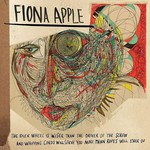The Idler Wheel Is Wiser Than the Driver of the Screw...
Studio Album by Fiona Apple released in 2012Every Single Night | |
Daredevil | |
Valentine | |
Jonathan | |
Left Alone | |
Werewolf | |
Periphery | |
Regret | |
Anything We Want | |
Hot Knife |
The Idler Wheel Is Wiser Than the Driver of the Screw... review
Fiona Apple’s mysterious seven years
The less performers release records, the more valuable they become, the harder the anticipation grows and the stronger the fear is to be disappointed with them. In her sixteen years on stage, Fiona Apple has never disappointed, yet she has not got so many opportunities to do so. Because since 1996, she has released only four long players, each a big, widely discussed event and a phenomenon interpreted in so many ways. Fiona’s new studio work appeared seven years after the release of its predecessors, but her followers will hardly ever know what made her keep silent for so long. As for Fiona herself, she claimed that she had not noticed where and how this whole time passed. She did not take part in side projects, did not get busy with public duties and did not give birth to a lot of children, so she failed to give a clear explanation what she had been doing during the stretched while between the two latest releases. Maybe, she spent a part of this time making up a title for hew fresh album. It really is spacious: The Idler Wheel Is Wiser Than The Driver Of The Screw And Whipping Cords Will Serve You More Than Ropes Will Ever Do. Keeping in mind her troubles with the label assigning a producer other than she preferred for her CD Extraordinary Machine, the singer has decided this time to do the production herself.
Soul inside out
Sounding much rawer and more ‘like live’ compared to Apple’s first efforts, The Idler Wheels... presents her most mature and consistent work to date. Fiona, like before, relies solely on her unsurpassed poetic skills and wide vocal abilities. The opener Every Single Night erases the distance between the performer and the audience, which many would be unprepared for. Fiona whispers in verses and screams in choruses, and the listener does seem ready for this kind of sincerity. The lyrics for this album displays unprecedentedly many autobiographical hints. Sufficient to mention Jonathan, a song dedicated to writer Jonathan Ames, the singer’s former lover. The poetry of The Idler Wheels… is Apple’s personality turned inside out, flashes of her irritation, bursts of pain, and glimpses of hope. Periphery is a confession of a person who decided she does not need anybody else in her life, but this is not a statement; rather an outcry to a beat so monotonous that it is close to getting your nerves to break down. The musical accompaniment is reduced to basis and composed of pinpoint, like airstrikes, piano parts and drums which do not as much as create rhythmic patterns, but rather breed or develop the general acoustic chaos.
Not as shocking as honest
The Idler Wheels… tempts to call the album a challenge for the audience, a test for flexibility of tastes, but there is no attempt to shock anybody in Fiona Apple’s new record, and there has never been any. She does not tease the public, pick on anybody and she never tries to produce any certain effect. Avoiding conventional forms and common rules, she just feels an urge from time to time to express herself, and you can take whatever way suits you. Again, it is more than just an outlet of energy or emotions, because, like a surgeon, Fiona is very attentive in choosing right words and expects you to follow her lyrics as soon as you get down to her album. The rest is not as important to her. Regardless of the music, she may effortlessly switch from singing to monologue and from there to dialogue, like in Daredevil. However, in exchange, the singer will request the listeners for their feelings too, and you may be sure you will have some. You just cannot remain indifferent hearing the touching ballad Werewolf with merry children’s cries in the chorus. The record comes to an end too soon, especially for an album that made you wait so long, but the final song, Hot Knife, is very optimistic as the artist sings carelessly to ancient tribal drums in a voice so distant from fuss and troubles of the world.

